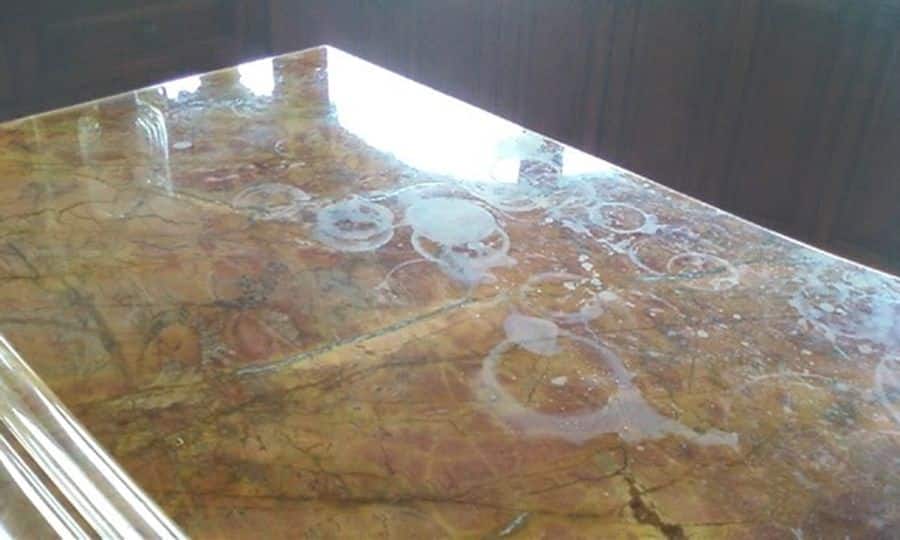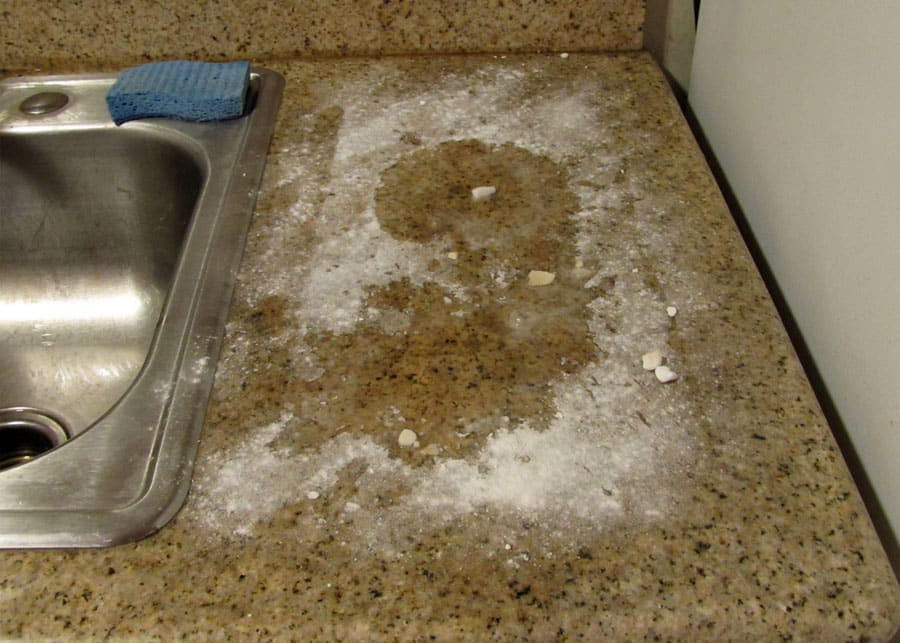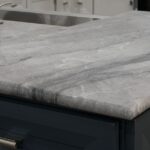
If you’ve chosen Granite as your countertop material, you can rest assured that it was a good choice. This natural stone is extremely hard and durable and it definitely can’t be stained easily. That’s not to say granite can’t be stained at all. Granite can still suffer from water stains, so we’re going to discuss how to remove it.
Under some circumstances water stains, or worse, hard water stains can happen. But don’t worry too much about it. In this article, we will discuss everything about water stains, how they can happen and how to remove them.
Looking for some more tips on how to take care of your granite countertop? We’ve got you covered! Just head to our definitive guide on granite countertops to find everything you need!
Understanding Granite Water Stains
Granite is a porous material, which means it can absorb water and other liquids and makes it susceptible to stains. With that being said, it’s important to remember granite is one of the less porous natural stones, and, provided it’s properly sealed, it won’t stain at all.
Find out more about sealing by reading our article: “How To Seal Granite Countertops”.
Water stains happen when an unsealed granite surface absorbs water that’s been sitting on it for too long. Now, simple water stains shouldn’t be much of a problem, since they will evaporate quickly, thus leaving the stone without causing any visual damage. The real baddies here are hard water stains.
Hard water is simply water with high mineral content. When it sinks into a granite countertop, those minerals will remain there even after the natural evaporation of the water that brought them there. That’s why hard water stains can be hard to remove and really inconvenient.
We will teach you all the methods you can use to restore your water-stained granite and make it look beautiful again.
How to remove hard water stains from granite
Since there’s no way to know for sure how stubborn your stain really is, we will start with simple tips and techniques and move on to more complex solutions.
Scrubing with water and detergent
This simple fix is the first you should try. Use a bristled brush to scrub the stain with gentle detergent (dishwashing type, for instance) and water.
If it gets the job done, great!
Scrubbing with a special paste
Make a paste of baking soda and water, or talc with a diluted solution of ammonia, bleach, or hydrogen peroxide. Use a soft brush to scrub the stain with the paste and then rinse it thoroughly.
If you’re getting results from this procedure, repeat it until you’re satisfied with the progress.
Scraping superficial deposits
If you notice that the water rings are sitting on the surface, you can resort to more abrasive techniques to try and remove them. For instance, you can scrub softly with a Brillo pad and scrape with a razor blade.
Using a poultice
When the stain has sunk in deep enough just applying products to the surface of the granite won’t be enough to suck it out. However, using an appropriate poultice and leaving it there for a few days might do the trick.
The poultice is prepared by mixing water, baking soda, and hydrogen peroxide. Your goal is to make it the same consistency as peanut butter.
Apply the poultice to the stained area forming a ¼ to ½ inch thick coating. Extend this coating beyond the stained area by at least 1 inch. Cover it with plastic and tape it for sealing.
After 24 hours, remove the plastic and let the poultice dry for another 24 hours. The drying process is what pulls the stain out of the stone and into the material.
Then, remove the poultice, rinse it with water, and buff dry with a soft cloth. Check how it affected the stain, it might take up to 5 applications to remove it thoroughly.
If the homemade poultice is not enough to remove your stains, you can try commercial granite poultice. However, chances are you’re dealing with a hard water stain that has sunk too deep and can’t be removed.

How To Prevent Hard Water Stains On Granite Countertops?
The best way to protect your granite countertops against any stain is cleaning spills as soon as they happen and, of course, sealing them whenever necessary. In order to better understand the process of sealing, and finding out how and when you should seal your countertops click here.
If you live near Sarasota, you can count on our stone specialists at Eagle Stones to help you with granite repair and restoration.
FAQ
Yes, it can. It is less porous than other natural stones, but it can still stain if not cared for. A way to avoid stains is to seal granite.
Yes, it does. Granite is very resistant, both to physical damage and stains. However it is still a natural stone, therefore porous, so sealing it is a must to ensure its long last quality.
It is possible, yes. This article gives you several options according to the stubbornness of the stain in question.



